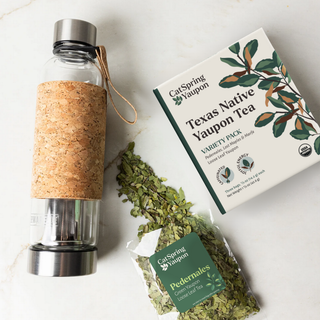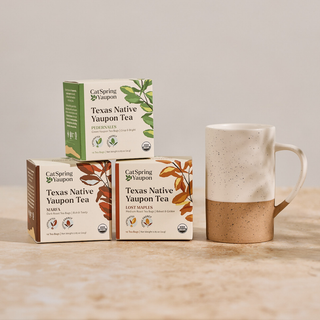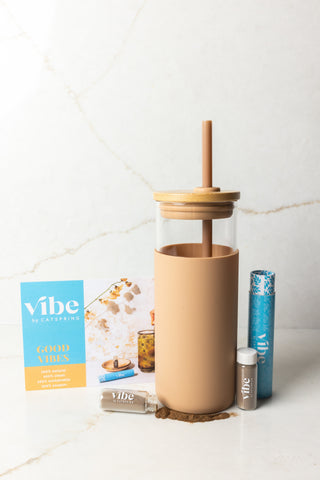Staying hydrated is one of the best remedies when fighting off the flu. The benefit of drinking tea to stay hydrated is that many teas also confer great benefits to combat different symptoms such as a sore throat, a runny nose, and sore muscles. In this guide, we ranked and reviewed the best teas for the flu.
If you want to get some for yourself, we have a collection of the best teas for the flu right here in tea bags, loose leaf, or iced tea pouches.
What is the Best Tea for the Flu?
1. Yaupon Tea
Yaupon is the only naturally caffeinated plant native to North America. This means that unlike other teas that are traditionally made with Camellia sinensis, yaupon has unique properties in addition to caffeine. One of these is the pairing with theobromine (the same compound found in chocolate that boosts your mood). When combined with caffeine, theobromine improves performance while minimizing susceptibility to distractions.
Benefits:
- Improved attention and reaction time thanks to the effects of caffeine and theobromine together.
- Decreased chronic inflammation via chlorogenic acid (CGA) that has anti-inflammatory properties.
- A boost for your immune system from antioxidant activity that remove free radicals in your body.
Side Effects:
- May cause sleeplessness due to caffeine if large amounts of yaupon are consumed all at once.
Try our CatSpring Yaupon tea to combat the flu. It’s organic, non-gmo, kosher, sustainably grown, and naturally caffeinated.
2. Peppermint Tea
Peppermint tea has a signature minty flavor due to its easy brewing using mint leaves. This menthol based flavor can help clear out sinuses and make it easier to breathe while also freshening your breath instantly. There is also research that suggests it can also kill germs that cause dental plaque, helping protect your teeth. A refreshing glass that has a cooling effect, this is a yummy option for those looking to ease flu symptoms.
Benefits:
- Support your immune system thanks to antimicrobial and antiviral properties.
- Ease headaches as peppermint is a natural muscle relaxant while the menthol increases blood flow that creates a cooling sensation.
- Decrease nasal congestion in large part due to the vapors that increase the perception of airflow, easing congestion pain and discomfort.
Side Effects:
- Can worsen acid reflux by relaxing the muscles around the stomach sphincter.
3. Chamomile Tea
Chamomile is primarily brewed from one of two daisy-like species of flower and commonly known for its stress-relieving properties to allow for necessary rest while fighting the flu. It’s long been believed to have health benefits though many are still under research. One benefit is supporting a healthy heart through the compound flavones which has the potential to lower blood pressure and cholesterol levels.
Benefits:
- May have antibacterial properties that can help prevent sickness and support your immunity.
- Get stress relief due to the powerhouse compound apigenin that can also relieve hangover symptoms including nausea, headaches, and and fatigues.
- Sleep easier thanks again to apigenin that binds to GABA receptors in your brain and releases signals that have a calming and relaxing effect.
Side Effects
- Potential drowsiness that may worsen fatigue from a hangover.

4. Echinacea Tea
Native to North America, Echinacea tea is a member of the daisy family and has been used for centuries to remedy many ailments including the common cold and the flu. It’s made by infusing the leaves and bright colored flowers in hot water, resulting in a floral aromatic brew. It has antioxidant and immune-supporting properties that aid in recovery from illness and may reduce the duration of respiratory conditions.
Benefits:
- May reduce the duration and occurrence of the common cold or flu as suggested by some studies.
- Improve your immune system with the vitamin C and antibacterial properties of echinacea tea.
- Reduce pain thanks to echinacea’s ability to reduce the sensation of pain.
Side Effects:
- May cause nausea due to strong floral aroma.
5. Ginger Tea
Ginger tea has been used for thousands of years as a cure for a myriad of problems. A caffeine free option, ginger is rich in antioxidants and can help you as you tackle your tasks. As a rule of thumb, one cup of ginger tea contains about 250 milligrams of ginger so aim to drink two to four cups of this tea to help you recover from flu symptoms. Especially when using fresh ginger to steep your tea, you can get a lot of the benefits of this refreshing brew.
Benefits:
- Bolster your immunity with antioxidants that protect your body from toxins and free radicals while also relieving cold and flu symptoms which can make you feel foggy.
- Combat nausea thanks to ginger’s active ingredient, gingerol, that’s been shown to relieve an upset stomach in pregnant women and chemotherapy patients.
- Wake yourself up with its strong and distinctive flavor.
Side Effects:
- Makes heartburn worse because it relaxes the muscle that prevents stomach bile from entering the esophagus.

6. Hibiscus Tea
Hibiscus tea is made from steeping parts of the hibiscus plant in hot water. It creates a distinctive, beautifully vibrant, fuschia colored brew. Oftentimes the brew has a taste profile similar to cranberries, with a slight sweetness and a bit of bitterness, and can be enjoyed hot or cold. Some animal studies have shown that hibiscus tea can increase antioxidant activity, though these results are still being researched in humans.
Benefits:
- Brew with ease and complement its sweet undertones with a favorite sweetener such as honey.
- Boost your immune system and remove toxins with the powerful antioxidants including vitamin C and beta-carotene.
- Fight off bacteria with potential antibacterial properties seen in animal studies and that indicate hibiscus tea can reduce bloating, gas, and cramping.
Side Effects:
- May interact with medicines like acetaminophen if consumed in very large quantities.
7. Green Tea
Green tea is made from the traditional tea plant Camellia sinensis and has not undergone oxidation like black teas. It has a multitude of health benefits and similar to Yaupon, it has natural caffeine in it. Each cup is full of antioxidants which can provide allergy relief and soothe inflammation.
Benefits:
- Protect your cells with the polyphenols and catechins from green tea that reduce free radicals that damage your cells.
- Ease inflammation with antioxidants that soothe inflamed tissues and organs.
- Protect your cells with the polyphenols and catechins from green tea that reduce free radicals that damage your cells.
Side Effects:
- May cause sleeplessness due to caffeine if large amounts are consumed all at once.
The Bottom Line
Owing to their amazing healthy-boosting properties, these are some of the best teas for the flu. They can help soothe symptoms of nausea, congestion, and fatigue to ease the flu experience especially as flu season comes around.
If you want to get our best tasting tea for the flu, check out our organic, naturally caffeinated CatSpring Yaupon tea here.
Medical Disclaimer: This article is for informative purposes only and shouldn’t be taken as medical advice. If you have serious health-related issues you should reach out to a medical professional. While we have studied the scientific research available, this is not intended to diagnose, treat, cure, or prevent any disease.













